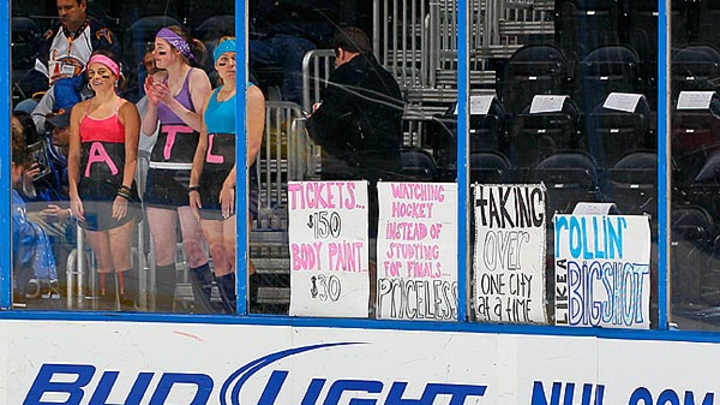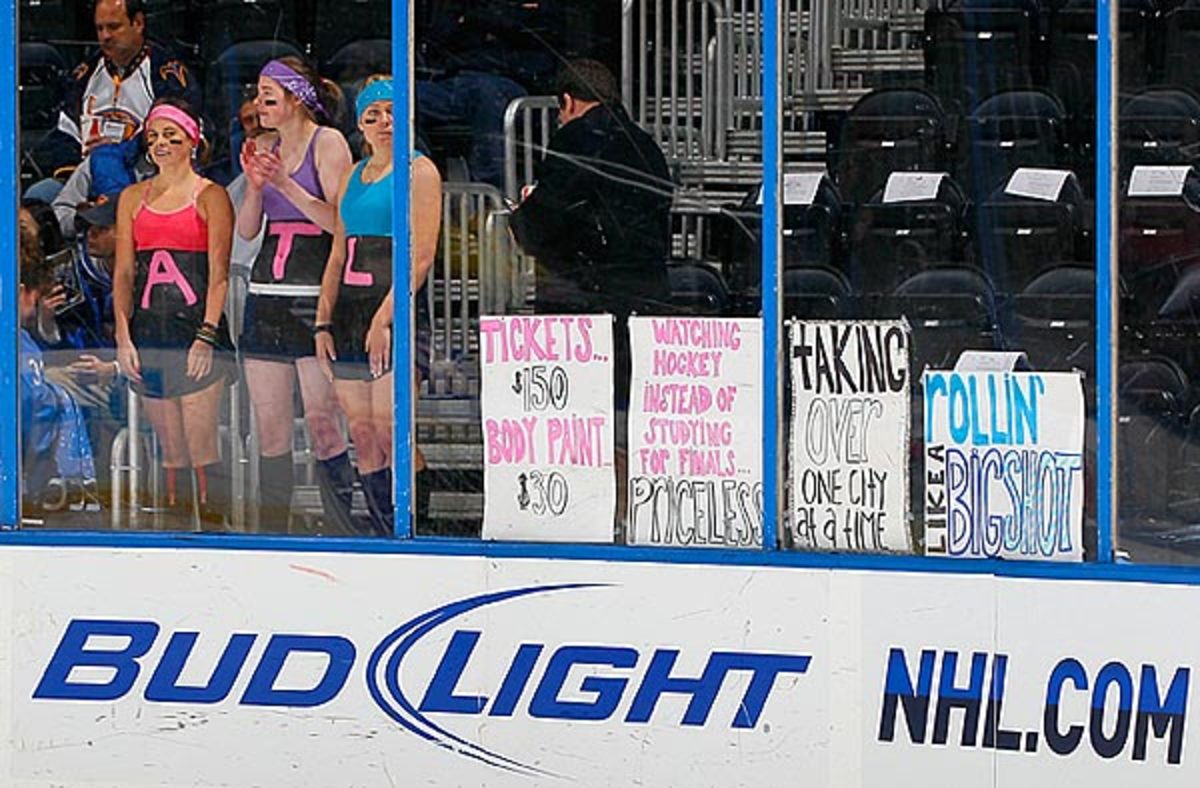Thrashers' plight stirs relocation threat

There may be nothing about the Thrashers' attendance woes that a little winning (in the postseason) wouldn't fix, but then again, Atlanta's fans are notoriously fickle. (Kevin C. Cox/Getty Images)

By Stu Hackel
Hockey traditionalists -- and I am one -- frequently criticize the NHL for locating teams in the Sun Belt and claim their problems are simply a matter of their location. But the easy explanation isn't always the right explanation, and in the case of the Atlanta Thrashers, ownership's legal entanglements and team's competitive futility during the course of its existence have easily contributed as much, if not more, to the franchise's failings.
Chris Vivlamore in The Atlanta Journal-Constitution reported Wednesday that if the current owners, Atlanta Spirit, don't find additional partners or a buyer for the whole franchise that are willing to keep the Thrashers in town, the team may go the way of its predecessor, the Flames, and move.
Now, it's not wrong to wonder about the NHL's decision to drop a team in Phillips Arena. The league had already gone through one bad experience in Atlanta, but it wasn't because the Flames lacked fan support.
In fact, the Flames were wildly popular at first, as colorful former Canadiens star Bernie (Boom Boom) Geoffrion became the face of the franchise, first as coach and then as TV announcer. But the original owners didn't account for how the upstart World Hockey Association, which debuted the same season as the Flames, would change the economics of the sport. The WHA drove up player salaries to levels that the Flames owners could not sustain (and its teams were not alone in their fiscal difficulties as many of the NHL's post-1967 franchises went through rocky times). Having no playoff success disappointed the fans who drifted away.
So, the NHL returning to Atlanta was not a completely harebrained notion, although no one can guarantee a winner, especially from an expansion team. Of course, there are those who have called Atlanta the worst sports city in the U.S. and insisted that it will only support a winner. In non-traditional markets especially, winning matters. And the Thrashers have not won much during their history. Making the playoffs once in 10 seasons puts them squarely in the non-support category.
Yep, the attendance is low: 28th in the NHL. But during the seasons on either side of the lockout, the Thrashers played to 85 percent capacity and things looked a bit brighter. Now they're down to around 13,000 per game, roughly 70 of capacity, despite the fact that they have been more entertaining this season with some recognizable players like Dustin Byfuglien (who ownership locked up for five years). Unfortunately, the Thrashers' best stretch came during the football season when attention was low. Sneaking into the playoffs will require a good stretch run.
It's a mistake, however, to pin all the trouble on a hockey team in non-hockey country. The recession has had an impact on Atlanta, with unemployment over 10 percent and rising, while the nation inches in the other direction. The Thrashers' corporate brother, the NBA Hawks, are 24th in NBA attendance, down nearly 2,000 paying customers per game from last season -- and they're currently a playoff team.
Compounding matters is the toxic relationships among the Thrashers' owners, a group that likes to sue each other and even their own lawyers. The latest suit charged their former legal counsel with drafting a “fatally flawed” and “botched” contract written to buy out former partner Steve Belkin, who held up a sale of the team while he was being sued by the other owners. It prevented any sale for nearly five years before that suit was finally settled in December. According to the suit, Vivlamore wrote, ownership reported more than $130 million in operating losses since 2005 and the team's value also dropped by more than $50 million.
"There is no doubt that the long-standing ownership dispute has damaged this club significantly," NHL Deputy Commissioner Bill Daly told Ray Glier in USA Today. But Daly reaffirmed the NHL's desire to keep the team where it is, in the league's eighth largest TV market, which is also home to a number of major corporations.
Perhaps some of those lawsuits were unavoidable. Regardless, they certainly tied up lots of money and energy that might have been used to better promote the Thrashers, build a winner and keep some of the team's superstars from wanting out over the years (and it's a pretty impressive list that includes Marian Hossa, Dany Heatley and Ilya Kovalchuk). But the Thrashers also made some mistakes with players (1999 first overall draft pick Patrik Stefan comes to mind) and suffered a serious blow to their image when Heatley's car wreck killed teammate Dan Snyder in 2003.
No one knows how well this team would have done financially and at the turnstiles had it made the playoffs as often as the Flames (who only missed the postseason twice in their eight NHL seasons) or advanced a round once or twice. There's nothing like playoff success to cement ties with a fan base, no matter where a team plays. But it's also possible that it wouldn't have mattered, given the fickle nature of the local fans and the other problems this team faces.
For now, Atlanta Spirit co-owner Michael Gearon has said there is a “sense of urgency” to get some fresh money or a new owner on board and get fans in the stands.
Last week, the city and provincial governments of Quebec announced they would build a new arena to lure and NHL team even though the NHL has made no promises to them or to Winnipeg. Both cities are ravenous for a return of NHL hockey. It's way too soon to say that the Thrashers might become the new Nordiques or the new Jets, and Quebec doesn't even have a suitable arena yet. But that's not going to stop some hearts up north from pumping a little harder when they learn about the Thrashers' plight.
